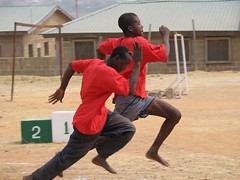| Special Olympics (Photo credit: MikeBlyth) |
| LONDON, ENGLAND - JULY 27: Richard Banda is the First Gentleman of Malawi and a former Olympic athlete for Malawi. He arrived in England for the London 2012 Olympic Games to support the Malawi athletes (Image credit: Getty Images via @daylife) |





No comments:
Post a Comment